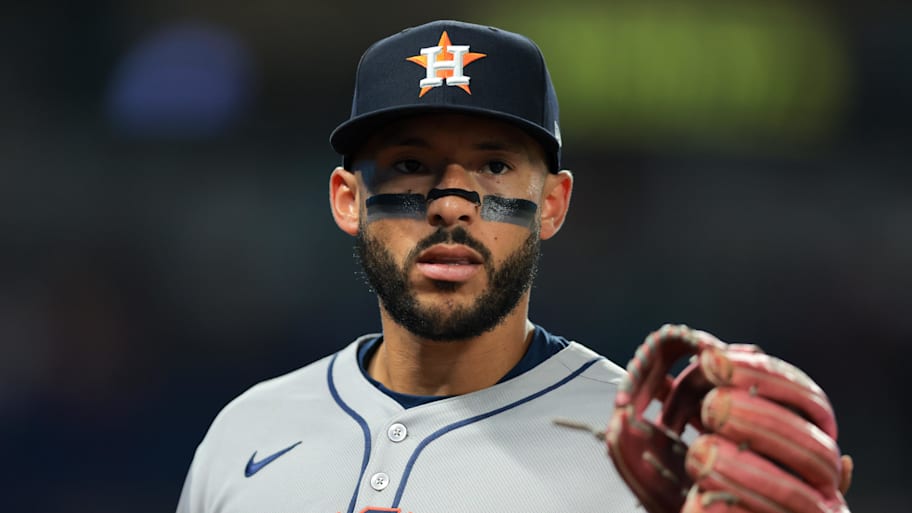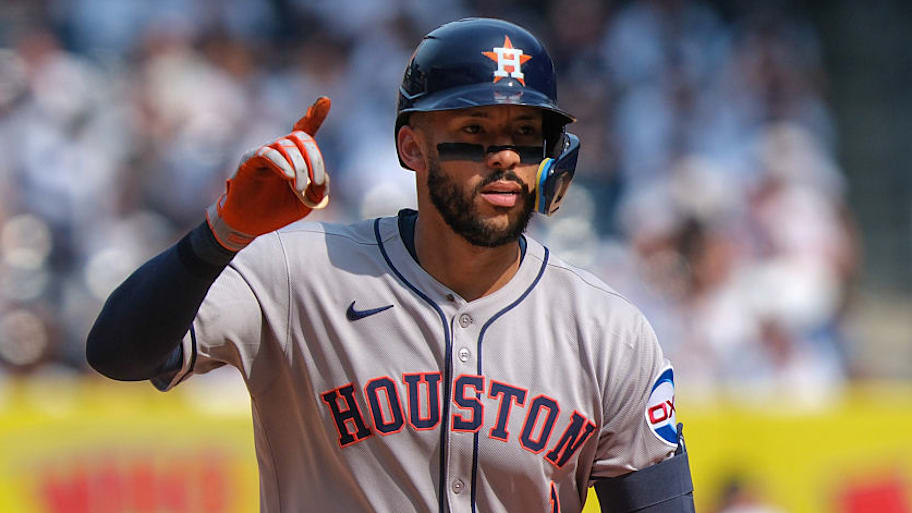NEW YORK — Carlos Correa is not the first person in history to suggest shortening up with two strikes, but a week after he discussed his approach in a hitters’ meeting, his new—and old—teammates are still marveling at his turn of phrase.
In those counts, he told them, “I’ve lost the right to slug.”
So they were utterly unsurprised that in his seventh game back with the first-place Houston Astros, his first against the rival New York Yankees, as fans booed and the game hung in the balance, Correa lined a 10th-inning, 1–2 single to center to drive in the go-ahead run.
“He walks his talk,” says center fielder Taylor Trammell. “He’s a winner.”
The Astros did indeed win that game, as Correa knew they would, even as a 2–0 lead evaporated and he strode to the plate to lead off the 10th against Devin Williams, who was the best closer in the game before struggling mightily this year. Extra innings, two strikes, a man in scoring position as 46,027 people jeer their hearts out for you?
“I love it,” Correa says. “I live for it.”
He doesn’t quite prefer hitting with two strikes—”I’d rather get a hit on the first pitch,” he says with a grin—but he knows he thrives in those moments, mostly because they don’t frighten him. “Once you have two strikes, I’m never thinking I’m gonna get out,” he says. “I’m always thinking of positive outcomes. So I think that’s half the battle. And then, you know, you gotta be mechanically clean, and you gotta feel good at the plate and have a good approach, but the mental is the most important thing.”
Nearly four years after they let Correa sign with the Minnesota Twins in free agency for what eventually became seven years and $235 million, it was that attitude the Astros wanted back.
“One of the big things with Carlos is his leadership,” says general manager Dana Brown, who nabbed Correa, 30, at the July 31 trade deadline for a pitching prospect and the promise to pay $70 million of the $103 million Correa is due over the next two and a half seasons. “That’s probably the biggest thing with him for us. We knew in acquiring him that we were getting more than just a really good player. [He’s] a leader in the clubhouse, and a guy who's won before. He’s a winner.”

Most of the core that made seven straight American League Championship Series, advanced to four World Series and won two of them had gone: third baseman Alex Bregman to Boston, Correa to Minnesota, center fielder George Springer to Toronto, right fielder Kyle Tucker to Chicago. Until a week ago, second baseman José Altuve was the only player from the 2017 title team still on the active roster. (Lance McCullers Jr., who has missed much of that stretch battling a litany of injuries, is currently dealing with a blister.) Brown acknowledges that those players took some of their fire with them.
“That’s one thing that this team could use, with losing Bregman,” he says. “That was big. And now filling a big leadership void with a familiar face in Carlos—that’s a beautiful thing.”
Correa understands what it takes to be an Astro—the relentlessness at the plate and precision on defense but also the mental fortitude required to play your entire career as a villain. Even this weekend, nearly six years after details of the banned sign-stealing enterprise Houston used in 2017 came to light, Yankees fans still hollered about cheaters. (Amusingly, Yankees fans boo Altuve more than any other player in the sport, even though everyone involved agrees Altuve did not approve of or take part in the scheme. Regardless, it might be time to try another approach: Altuve has an .870 OPS here since the crowd started jeering him regularly in 2021, compared to a .780 OPS before that. “If I’m a fan, I would try to make it feel like spring training here,” Correa suggests.) Correa sounds almost disappointed when he muses that some of the hatred seems to have died down. The energy fuels him.
Brown was still the Atlanta scouting director the last time Correa wore orange, but when manager Joe Espada and bench coach Omar López heard Correa might be available, they lobbied Brown hard. Everyone knew Correa was a good player—in his first stint with Houston, he seemed to be on a Hall of Fame track before injuries derailed some of his time in Minneapolis—and a vocal leader, but it was his attitude Espada and López kept highlighting. For all his talent, Correa also possesses a grinder’s mentality that keeps his teammates engaged.
“With two strikes, he’s not afraid to shorten it up,” says Brown. “He's not afraid to foul a few balls off, run up the pitch count. We needed that, because guys were swinging early in the count. And I think he’s kind of revived us in that way where he shows that type of leadership even in the batter’s box.”
His new teammates noticed that intensity immediately. In part because of his familiarity with the organization and in part because of his personality, Correa strode into the clubhouse on his first day back ready to be the guy. (Well, he made one call first. “I needed to get the green light from the boss first,” he says, referring to Altuve, one of his longtime best friends. “He said, ‘Whatever you want to do here, do it.’”) That same day, utilityman Cooper Hummel tried to introduce himself and shake his new teammate’s hand. Correa pulled him in for a hug instead.
He speaks up in hitters’ meetings and to the coaching staff. On his first flight back with the team, from Boston to Miami, Correa sat next to Espada and offered a few ideas. “Just having everybody on the same page, like we did from 2015 to 2021,” Correa says vaguely. He grins sheepishly and apologizes. “I know that’s not much.”
Whatever he said, he put it into practice himself. “He knows how to get the most out of himself,” says first baseman Christian Walker, who signed in Houston this year. “He leaves no stone unturned. I mean, his warm-up routine is two hours long, it feels like.” Trammell and Hummel study the way Correa pores over scouting reports and fine-tunes his approach.
He played shortstop for every one of his defensive innings until this month, but because the Astros already employ Jeremy Peña there, Correa happily volunteered to move to third, officials say. Brown smiles every time the pitching coach or catcher heads out for a mound visit and Correa trots out to join them and add a tip or just some encouragement. He pulls teammates aside to praise them for small moments—a walk in a tight game, a single after a defender repositioned himself—that he knows win ballgames even if they do not make the highlight reel. “He’s tuned into everybody and how they can help the team,” says Trammell.
By all accounts, Correa loved his time in Minnesota. He has told friends he plans to keep his home there. He told Twins leadership he would not waive his no-trade clause to play anywhere but back home in Houston. Teammates raved about his leadership and dedication there, just as they do with the Astros. But his tenure there was disappointing, perhaps in part because he missed the bright lights. His Twins made the postseason only once in three full seasons. Correa hit .409 with three doubles in those six games, but Minnesota fell in four games in the ALDS—to the Astros. He had a .704 OPS and was worth 0.1 WAR in 93 games for the for the moribund Twins this year. In seven games with Houston so far, his OPS is 1.006 and he’s been worth 0.4 WAR.
“He got, like, a shot in the arm coming back,” says outfielder Chas McCormick, who overlapped with Correa in 2021. “He looks fresh. He looks excited. It’s really nice to watch him, you know, play like he can. He loves playing in the spotlight.” Correa is back on a winning team, and so far, he is back to winning.
More MLB on Sports Illustrated
This article was originally published on www.si.com as Carlos Correa’s Impact on the Astros Has Been Swift, On and Off the Field.
